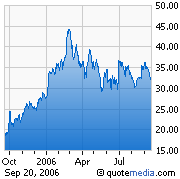Vertex Pharmaceutical (VRTX) has this success formula in their late stage product VX950 for treatment of Hepatitis-C. It has all the characteristics of a blockbuster that could propel Vertex into the category of a great biotech company.
First the market; Hepatitis-C is a devastating infectious blood born disease that could get transmitted by blood or sexual contact. It can survive outside the human host for up to a week and was not discovered until early 90's. Some think the whole US blood supply was contaminated with this virus in the 80's since there was not testing done yet. What makes this virus more dangerous is the fact that it has a dormant period of up to two decades. This means that we may have not even begun to see this epidemic yet. It is estimated that about 4 million people in the United States are infected with hepatitis C, which is about 2% of the population. The number of patients with chronic Hepatitis-C is expected to increase to 10.8 million in the next 10 to 12 years. Each year, there are about 35,000 cases of acute hepatitis C.
The treatment is difficult since by the time most people have found out they have Hep-C, their liver is severely damaged. The standard therapy is Pegylated-Interferon alpha, a protein that non-specifically increases the immune response and Ribavirin an antiviral. Unfortunately, this combination is not very effective. Last time I checked, the response rate was around 50%. Furthermore, the side effects are almost impossible to handle. I personally know someone who took these medications and he complained of having bad flu like symptoms every day for a year. This treatment is so bad that most people can not finish the 12 month duration and some become suicidal.
VX950 has shown tremendous efficacy with minimal side effects in early clinical trials. A phase Ib trial showed most patients responding very after a couple of weeks of treatment and in some cases the virus was completely gone which lead to the FDA granting fast track status. What makes VX950 special and hard to copy is that Vertex was a pioneer in this field. They were the first company to solve the 3D crystal structure of the protease protein that VX950 inhibits (they also did the same for HIV protease which revolutionized treatment of HIV). I don't want to get into the science but solving this structure and finding a molecule to specifically inhibit it that is safe and gets absorbed by the body is next to impossible. They have a huge head start and have solved some incredible problems. Even if someone wants to imitate this molecule, its chemical structure is so complicated that it makes manufacturing process development very difficult. VX950 is a direct result of huge perseverance by Vertex scientists and management mixed with some good luck.
Because of all these reasons, I believe VX950 will make it to the market and will be a multi billion dollar product with limited competition for a long time. The product is not expected to launch until late2008 (aggressive timeline) but at $3.5 billion market cap it has lots of upside movements left as this product moves through clinical trials. I expect Vertex's market cap to be around 7-10 billion right around the launch time and I will be aggressively buying dips from now until then. In addition to VX950, the company has products in trials to treat inflammatory diseases such as a p38 inhibitor which could be the first oral RA medication. They have a partnership with Merck to develop a kinase inhibitor for treating cancer and they have the first and second ever compounds in clinic to treat Cystic Fibrosis. Vertex should be admired for its science and should be a core holding in the biotech portion of any portfolio.
As of the posting date of this blog, Vertex is trading at $33.25 and should be accumula
 ted aggressively. It has been consolidating since making its high of about $44 for a 25% correction and has found support at $30.
ted aggressively. It has been consolidating since making its high of about $44 for a 25% correction and has found support at $30.During this time, VRTX has made a partnership with J&J for distribution of VX950 outside US worth about $545 million while keeping sales in US. They have also raised $300 million in a public offering and have retired some convertible debt. These activities should provide enough cash for VRTX to get this product to the market and become a success story.
JMHO